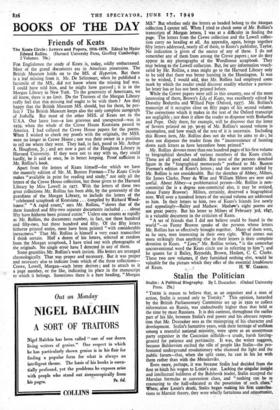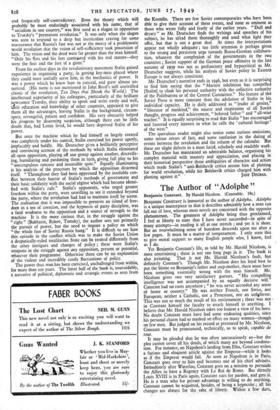Stalin the Politician
Stalin : A Political Biography. By I. Deutscher. (Oxford University Press. 25s.)
" THERE is reason to believe that, as an organiser and a man of action, Stalin is second only to Trotsky." This opinion, hazarded by the British Parliamentary Committee set up in 1920 to collect information on Russia, was undoubtedly higher than that held at the time by most Russians. It is this contrast, throughout the earlier part of his life, between Stalin's real power and his obscure reputa- tion that Mr. fDeutscher sees as the mainspring of his character and development. Stalin's formative years, with their heritage of serfdom among a resentful national minority, were spent as an anonymous party organiser in the Caucasian oilfields—a crude, harsh forcing- ground for patience and pertinacity. It was, the writer suggests, because Bolshevism exalted the role of people like Stalin—the pro- fessional underground revolutionary who shunned the light and the public forum—that, when the split came, he cast in his lot with them rather than with the Mensheviks. Even more, perhaps, it was because Stalin had decided from the first to hitch his wagon to Lenin's star. Lacking the singular insight and intellectual boldness of the Bolshevik leader, Stalin accepted the Mandan formulas as convenient clues, and "nothing can be as reassuring to the half-educated as the possession of such clues." When; after Lenin's death, Stalin began making his first contribu- tions to Marxist theory, they were wholly fortuitous and opportunist.
and frequently self-contradictory. Even the theory which will probably be most enduringly associated with his name, that of "socialism in one country," was first used as a slogan in opposition to Trotsky's " permanent revolution." It was only when the slogan was seen to respond to a deep but inarticulate craving for some- reassurance that Russia's fate was not at the mercy of a problematic world revolution that the vision of self-sufficiency took possession of him. The vision and the deed were far greater than the man himself. " Only his fists and his feet contrasted with his real stature—they were the fists and the feet of a giant."
From his earliest days in the revolutionary movement Stalin gained experience in organising a party, in getting key-men placed where they could most usefully serve him, in the mechanics of power. It was a power which he knew how to conceal, and grew almost un- noticed. (His name is not mentioned in John Reed's still unrivalled classic of the revolution, Ten Dayi that Shook the World.) The intellectual superiority of his colleagues, particularly of the brilliant newcomer Trotsky, their ability to speak and write easily and well, tfieir education and knowledge of other countries, appeared to give them all the advantages, leaving Stalin in the background, circum- spect, revengeful, patient and confident. His very obscurity helped his progress by disarming suspicion, although there can be little doubt that, had Lenin lived, he would have deprived Stalin of his power.
But once the machine which he had himself so largely created was completely under his control, Stalin exercised his power openly, implacably and boldly. Mr. Deutscher gives a brilliantly perceptive and convincing account of the methods by which Stalin eliminated all open opposition, playing off one group against another, discredit- ing, humiliating and pardoning them in turn, giving full play to his "unscrupulous rancour and insensible spite." Equally illuminating is his analysis of the processes by which the opposition disarmed itself. " Throughout they had been oppressed by the insoluble con- flict between their horror of Stalin's methods of government and their basic solidarity with the social regime which had become identi- fied with Stalin's rule." Stalin's opponents, who urged greater freedom within the party, were unwilling to see it extended beyond the party, where the revolution had had to maintain itself by terror. The realisation that it was impossible to preserve an island of free- dom in a sea of coercion, and the hypnosis of party discipline, was a fatal weakness to the opposition and a source of strength to the machine It is the more curious that, in the struggle against the " right " (Bukharin, Rykov, Tomsky), the author sees not primarily the pursuit of power, but the need to impose a policy on which "the whole fate of Soviet Russia hung." It is difficult to see how this episode in the conflict which was to make the Soviet Union a despotically-ruled totalitarian State can be treated differently from the other intrigues and changes of policy ; these were Stalin's weapons in the struggle against any opposition, present or potential, whatever their programme. Otherwise there can be no explanation of the violent and incredibly costly fluctuations of policy. The power thus won has been exercised, unchallenged from within, for more than ten years. The latter half of the book is, unavoidably, a narrative of political, diplomatic -and strategic events as seen from the Kremlin. There are few Soviet contemporaries who have been able to give their account of these events, and none as eminent as those who wrote fully and freely of the earlier years. " Dull and dreary " as Mr. Deutscher finds the writings and speeches of his subject, he has sifted them thoroughly and used what light they offer, but that is not a great deal. At times the interpretations appear not wholly adequate ; too little attention is perhaps given to the strong and persistent urge towards Russo-German collabora- tion, whatever the complexion of the governments in the two countries; support of the German peace offensive in the late autumn of 1939 was not as perfunctory and hypocritical as Mr. Deutscher suggests, while his analysis of Soviet policy in Eastern Europe is not always consistent.
Mr. Deutscher's narrative ends in 1946, but even so it is surprising to find him saying that the "Marxist inhibition has compelled [Stalin] to cloak his personal authority with the collective authority of the Politbureau or of the Central Committee." No feature of the Soviet Press is more constant than the adulation of Stalin in his individual capacity. He is daily addressed as " leader of genius," " liberator of mankind," the source and inspiration of all Soviet thought, progress and achievement, " beloved father " and " all-wise teacher." It is equally surprising to read that Stalin " has encouraged and fostered every interest in what he calls the ' cultural heritage' of the west."
The querulous reader might also notice some curious omissions, some minor errors of fact, and some confusion in the dating of events between the revolution and the reform of the calendar. But these are slight defects in a most lucid, scholarly and readable work. Mr. Deutscher has maintained an admirable balance, organising his complex material with mastery and appreciation, and placing in their historical perspective those ambiguities of character and action which made Stalin's " anti-Bolshevik critics accuse him of plotting for world revolution, while his Bolshevik critics charged him with







































 Previous page
Previous page